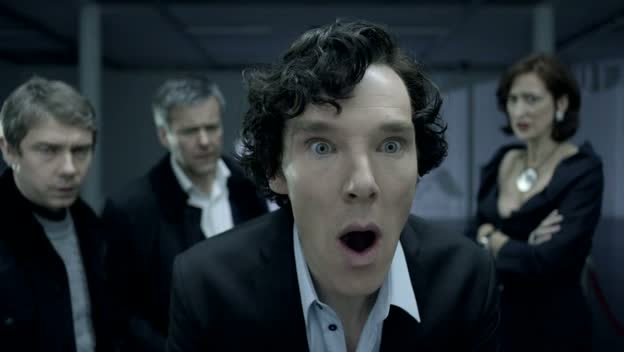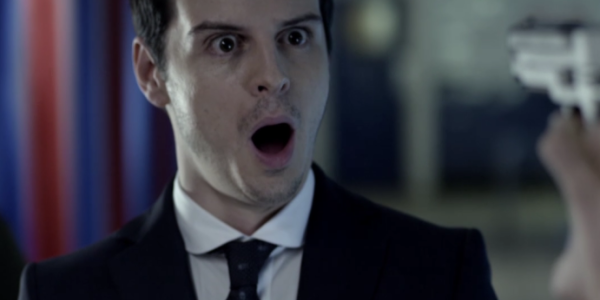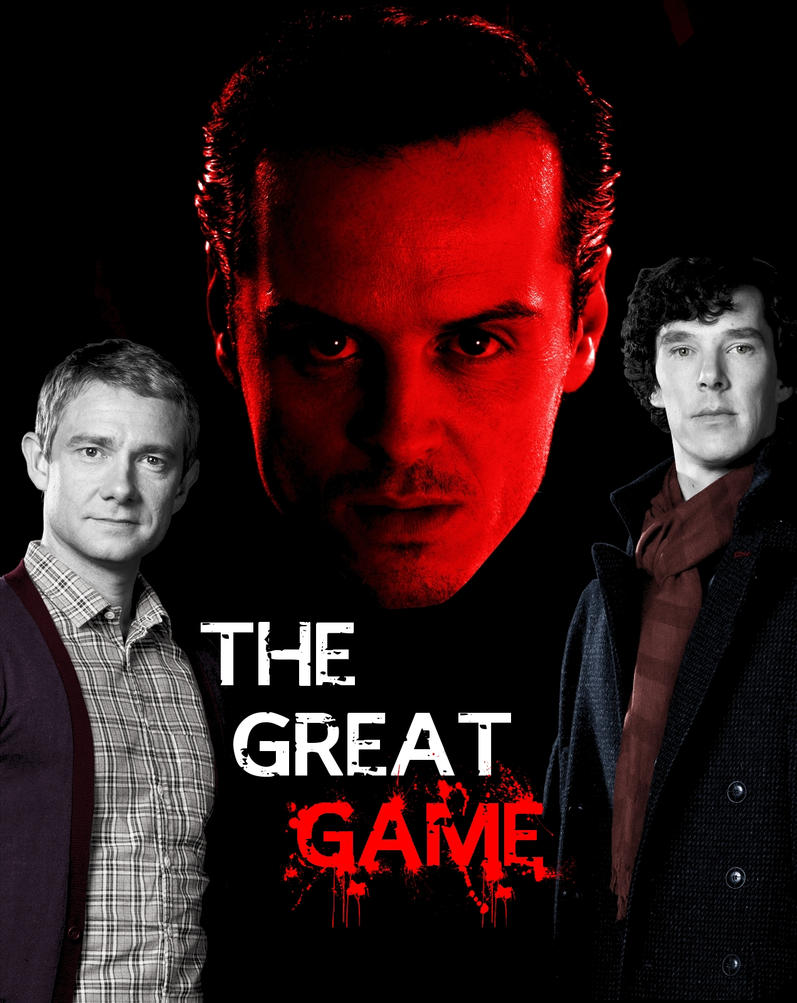SHERLOCK: THE GREAT GAME
Gamer Danger...
May I laugh now?
I started out with 'can I laugh now?', but given how Sherlock Holmes in Sherlock is a far stricter grammarian than I, I figured it might serve my case better if I began with the correct form of the question, asking for permission to laugh rather than asking if I'm physically capable of laughing.
Perhaps I was meant to laugh at The Great Game, or at least certain aspects of it. As we close out Sherlock's first season with the revelation of that Master Criminal and of said Master Criminal committing nefarious, I daresay, psychotic acts, I at times suppressed a desire to openly burst out laughing. The Great Game has a myriad of little stories that tie into one Great Story, and I have no dislike for it going the long way round to get to where it ends up. My objection to The Great Game regards two moments in particular and an overall sense that the Master Criminal was a little derivative of another Master from another Mark Gatiss/Steven Moffat production.
However, I'm getting ahead of myself, aren't I?
Sherlock Holmes (Benedict Cumberbatch) is bored. No case interests him, so he starts shooting the wall, driving his roommate John Watson (Martin Freeman) bonkers. This of course makes Watson miss a bombing across from 221 B Baker Street. Sherlock. however, has no interest in the case his brother Mycroft (The Great Game writer Mark Gatiss) pressures him to take: the theft of a memory stick containing the Bruce-Partington Program, a group of secret state documents detailing a missile defense plan. Not even the added bonus of suspected thief Andrew West (San Shella) being found dead by the tracks does not interest him.
However, something else does intrigue him: a strongbox where the bombing took place, with his name on it. Inside is a pink phone, but not the one from A Study in Pink. This phone connects Sherlock to a mysterious figure, one who is holding a woman hostage, bombs all around her. She reads out a message giving Sherlock 12 hours to solve a particular case, otherwise she gets blown up.
That case involves one that triggers Sherlock's memory: that of the death of Carl Powers. Powers was a teen who was found dead in a pool many years ago, and now Powers' shoes have been left for Sherlock to investigate. This was Sherlock's first unofficial case, he contacting the police telling them Powers' death was not an accident, and being rebuffed. As he investigates a few things are discovered. One, Molly (Louise Brealey) the morgue attendant who fancies Sherlock now has a new boyfriend, Jim from IT (Andrew Scott). Two, Sherlock deduces Jim is gay. Three, Watson's examination of the shoes show he missed all the important clues. Four, despite a woman being tied up with bombs Sherlock is dispassionate about the fate of the woman to say the least. Holmes does find that Powers was indeed murdered via a 'virtually undetectable' poison that caused his death in the pool.
 |
| WHAT? I'm not the first Sherlock? |
We move on to the case of a recently discovered Vermeer which Holmes believes is a fake. There is a connection with the discovered corpse of a guard at the gallery where the Vermeer will be exhibited and later sold. How to show the guard's death and the forgery are connected? Holmes deduces the killer here is a mysterious Czech hitman known as the Golem (John Lebar). Holmes and Watson, thanks to Holmes' network of homeless informants, track the Golem down, but he manages to escape. Undaunted, Holmes proves that the Vermeer is a fake thanks to learning from Watson that the guard, an amateur astronomer, figured a particular star cluster was not around at the time of the 'painting'. The threat of a child's voice being the hostage forces Holmes to work faster, and gives Watson a chance to show that Holmes' lack of knowledge of the solar system might have helped him solve the case faster.
We now turn to the Bruce-Partington memory stick case. Watson has been the one pushing to solve this case, feeling it his patriotic duty (and in an effort to get Mycroft to stop bothering him about it). We find that the killer was Andrew's fiancée's brother, who knew about the memory stick and wanted to sell it to cover drug debts but didn't know what to do with it after he accidentally killed Andrew. Memory stick recovered, Holmes decides to confront the mysterious 'M'. To his surprise, it's John who turns up at the pool where Carl Powers had died, bombs strapped to him. M reveals himself: it is Jim Moriarty, also known as Jim from IT. Moriarty tells Holmes to stay out of his business, but Holmes tells him he can't. It's a Mexican standoff, with Holmes aiming his own weapon on the bomb-covered coat Watson has managed to remove after Moriarty's brief departure.
 |
| Why do people think a cocked eyebrow is a sign of genius? |
In regards to other aspects of Gatiss' screenplay I think it took a long time to get around connecting the Bruce-Partington Program with all the mysteries Moriarty made Sherlock go through. In fact, were they even connected? The only real connection was the mentioning of Moriarty as the brains behind the Vermeer caper, which connected him to the other crimes, but I am not convinced that the memory stick affair was part of Moriarty's plan. In fact, if memory serves correct, it seems to be an appendage to The Great Game. The killing was an accident, and the killer never made any contact with Moriarty or any of his henchmen.
The worst part of The Great Game in terms of story came about in the search for The Golem. It's at this point where I did burst out laughing. Cinematically I appreciate that it tries to make the fight between Holmes, Watson, and the Golem tense and exciting. However, it not only looked like an outtake from a Bond film (with the Golem evoking memories of Richard Kiel's Jaws) but the hunt for this big bad assassin with the unique name had me laughing. I simply couldn't take it seriously.
 |
| OMG! I'm NOT a walking stereotype! |
As a side note, the character of The Master was created as a Moriarty-type villain to battle against The Doctor (a Sherlock Holmes substitute) and the Brigadier (the Watson figure). In the Classic series he started out as a suave, debonair figure who was the Doctor's intellectual equal. In the Revived series, he was just a bonkers power-mad figure. Similarly, Sherlock's Moriarty, particularly with how Scott plays him, reminds me too much of the NuWho Master. Yet I digress.
Let me continue on things that troubled me about The Great Game. The last hostage, the child, was both not featured and seemed to be thrown in there just to have a threat. I suppose that seeing a child strapped to a bomb was a bridge too far for Sherlock, and this was one time where I figured the entire 'bomb-strapped motif' could have been dropped altogether. I know why it was there (to both give Sherlock motivation to solve the puzzles and show his generally uncaring manner), but weren't the cases intriguing enough without having to see people suffer. Yes, I understand it was done to show Moriarty was a psychopath, but he could have achieved it with bombings.
I wasn't too impressed with the gay mocking with the Prince case and Moriarty himself, an oddity given Mark Gatiss is openly gay (I learned his name is pronounced Gay-tiss, not Gat-iss as I have been, but I'll avoid the temptation to read more into this than there is). I wonder if a straight writer put in the effeminate characters of Kenny Prince, his houseboy, and Moriarty would he/she gotten away with so much? A big problem I had with the story was when Holmes solves the Carl Powers case. Agatha Christie, another of the great British mystery crime authors, never liked the idea that a particular poison was 'virtually undetectable'. She had worked in a medical dispensary where she came upon many poisons, and she took great pride that in her first novel a medical reviewer complemented her on avoiding the 'virtually undetectable' poison bit. This came to me when Holmes said that the trace of poison found on the shoelaces was 'virtually undetectable' and thus not found in Powers' autopsy. I wasn't convinced.
This is not to say I thought The Great Game was awful. As much as I was unimpressed with Gatiss The Great Game is a great showcase for Freeman and Cumberbatch. We do get a deeper exploration of their personalities, Holmes' cold, almost Scrooge-like manner versus Watson's more moral view. Watson is appalled and angered at how cold Holmes can be towards the plight of Moriarty's victims. Holmes at one point says that worrying about them won't help save them, and Cumberbatch's delivery reminded me of Alastair Sim in A Christmas Carol. They work so well together and the teaming of Cumberbatch and Freeman is rightly held as a great duo. Una Stubbs as Mrs. Hudson brings a light touch, injecting comedy into the story and a delight in her all too few brief scenes.
I also enjoyed the nods to the Canon (the Five Pips from the phone, Sherlock commenting he'd be lost without his 'blogger', the 'Baker Street Irregulars' as homeless) and good moments of comedy at Sherlock's expense. The bits about Watson's blog and its popularity as well as Sherlock's ignorance of the solar system is played for laughs.
The performances from Cumberbatch and Freeman are the strongest parts of Sherlock. The story I felt was not the best, though it had good moments within it, and the guest actors Gatiss and Scott to me won't rank as the embodiments of Mycroft and Moriarty respectively. Still, The Great Game has enough to push it past being average, but not enough for me to think Sherlock is the be-all end-all version of Sir Arthur Conan Doyle adaptations.
I'd say it's more The Good Game.
 |
| Do you want to know a secret? |
6/10
Sherlock Season One: Some Thoughts
Next Sherlock Episode: A Scandal in Belgravia

Well, I suppose there is no hope that you will like the show beyond above average. Just a heads up, you will most likely dislike the first episode of season three.
ReplyDeleteMy only problem with this version of Moriarty is that he is a little too much like Ledger's Joker, but other than that I really like his portrayal of the character, however he does his best work in season two.
Since I have not seen this episode is three years I can't comment much on the plot.
-James
I do not dislike Sherlock but I suppose you're right: I don't see myself working up the enthusiasm others have for it. It's good but not great, but who knows? Maybe Seasons 2 & 3 will perk me up.
DeleteI didn't see the Joker/Moriarty similarity, but since it's been so long since I've seen The Dark Knight, I can't say for sure.